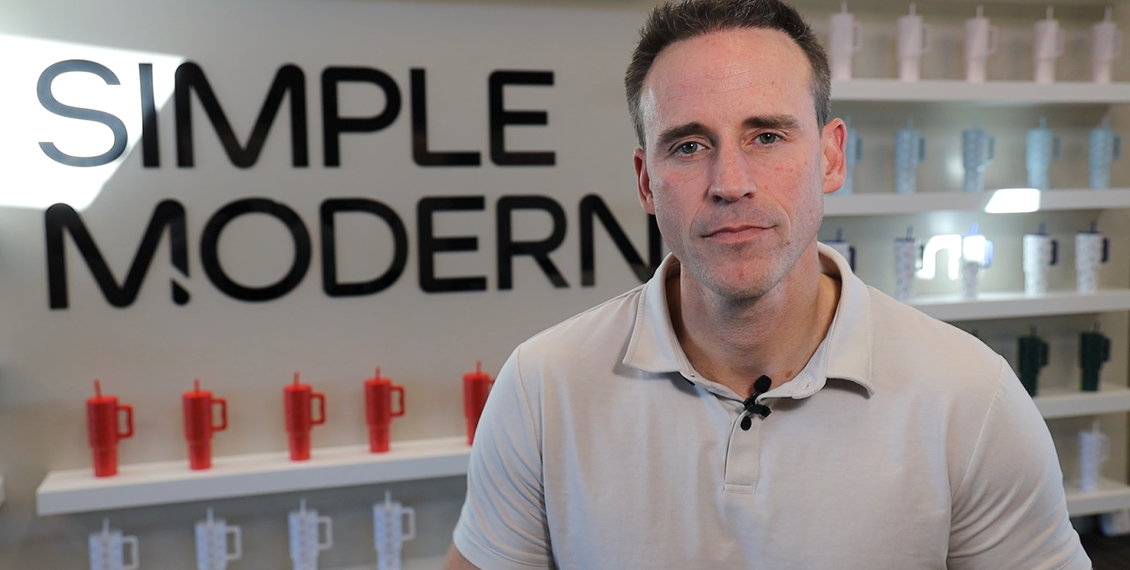OKLAHOMA CITY (OBV) – A top Oklahoma company is helping its employees afford child care.
Simple Modern co-founder and CEO Mike Beckham recently announced that employees within his company will receive up to $6,000 in child care reimbursements as a part of their annual compensation.
Beckham recognizes the importance of child care to his workforce.
“Over the past 10 years, childcare costs have exploded across the country. In many situations, the annual cost of childcare can be more than a full-time salary,” Beckham said in his announcement. “It doesn’t make sense to lose talented men and women from the workforce because of poor incentives. If we want to change this dynamic, we must change the math.”
Simple Modern, headquartered in Moore, Okla., is an Oklahoma-based drinkware company that manufactures high-end tumblers and water bottles. It’s a thriving company with around 125 employees and close to $200 million in annual revenue. However, the company does not ask its staff to put work ahead of family.
“From day one, our goal has been to create a company that doesn’t force people to choose between their careers and their families. Balancing these areas of our lives is not easy, but with the proper support, it is possible,” Beckham said. “My children have been one of the greatest joys of my adult life. I’m proud to lead a business that supports families.”
Beckham spoke with Oklahoma Business Voice about his decision to provide financial assistance to help his employees afford child care.
“When I think about child care, I think it’s an essential plank to building a team and recruiting, hiring, developing that entire process,” Beckham said. “We have so many gifted men and women in our company that also have a dream of building a family, and we don’t want to make them have to choose between those two things. Unfortunately, in our state, because of the cost of child care and sometimes the availability of child care, people have to make that choice.”

Beckham has witnessed the struggle to obtain child care. He said a recently hired employee initially declined to work at Simple Modern because they could not find a facility to care for their child while they were at work.
“Fortunately, they were able to come back a week later and say that they had gotten into a child care [facility],” Beckham said. “So, sometimes it’s cost and sometimes it’s availability. But either way, it’s very difficult to get excited about what’s hurting someone.”
Beckham said he wants to help build a work culture where professionals – women especially – are able to pursue a meaningful career while building a family.
Investing in the staff’s child care needs creates a deeper bond between Simple Modern and their staff.
“Employers are always complaining about how it’s difficult to attract talent, how it’s difficult to retain people. You have to demonstrate the kind of investment and the kind of loyalty and commitment that you hope to see reciprocated by your team. And I think that’s one of the things that we’ve seen here,” Beckham said. “We’ve had one person leave the company over the last 15 months, and I see that as a reflection of us creating an environment where, number one, people don’t have to choose between family and career; but also where our team is aware that we’re actively making investments in them. And as a result, we’re seeing people stay. It’s paying off.”
Megan Johnson, People and Culture manager at Simple Modern, said child care is important to the company because it’s a gap they can help fill.
“As a company, we felt passionately about bridging that gap for our employees and being able to provide a stipend for them to not have to worry about what they’re picking that month, if they’re going to be picking child care or if they’re picking groceries. And so we feel confident that was the right choice for us,” Johnson said.
Both the worker and the company benefit when child care assistance is offered as an employment incentive, Johnson said.
“I believe it’s a need and not a want, because, honestly, child care – you can’t go without it. No matter what, if you have children, you’re going to have to have child care,” she said. “So, it’s nice to be able to have that support in the companies and be able to support your employees in that way.”
Oklahoma has been experiencing a child care crisis for several years now. Child care facilities are either too few in many areas of the state, too expensive or often both.
A recently released Oklahoma State University report, Understanding Access and Barriers to Childcare in Oklahoma, cited Center for American Progress data, which shows that 55 percent of Oklahoma’s population live in childcare deserts and that such deserts are in both rural and urban areas.
OSU’s report referenced DHS Childcare data that showed Oklahoma having 3,102 licensed child care facilities across the state’s 77 counties in October 2023.
“This number ranged from zero licensed facilities in Cimarron County to 839 facilities in Oklahoma County,” the report states.

Oklahoma Health and Human Services classified 35 counties – nearly half of the counties in Oklahoma – as a childcare desert.
“The implication is that over 66% of children in these communities may be without childcare options,” the OSU report states.
If a parent has a child care facility in their area, they might have trouble finding a spot for their child. The report found that Oklahoma, on average, has 3.5 children for each licensed childcare slot.
“The median is 2.45, which means that half of all counties in Oklahoma have more than two children per available licensed childcare slot,” the report states.
However, a parent might not be able to afford child care even if they are able to find a facility with an available spot.
Child care had an average annual cost of $11,582 per child in 2023. The report described the annual cost as taking 10 percent of a married couple’s median household income and 32 percent of a single parent’s median household income.
Programs such as the Child Care and Development Block Grant (CCDBG) Act and initiatives like the Child Tax Credit expansion were enacted to help make child care more affordable for working families, but many families throughout the nation and across Oklahoma still struggle.
“Despite these efforts, challenges persist, and access to affordable, high-quality childcare remains a significant concern for many American families, including Oklahomans,” the report states.
Oklahoma businesses have been adversely impacted by the childcare facility and worker shortage, seeing a 6.1 percent decline in workforce labor participation among Oklahoma mothers who have children ranging in age from infant to four years old.
“Often times, the parent has to either leave the workforce or make a new work arrangement. It’s even harder if a family has nontraditional hours of care that they need; it’s very difficult to find childcare that operates outside traditional hours of 7 a.m. to 6 p.m.,” Carrie Williams, executive director of Oklahoma Child Care Resource and Referral, previously said to Oklahoma Business Voice.
Parents nationwide are exiting the workforce due to diminishing child care options.
A U.S. Chamber of Commerce Foundation study states that 58 percent of working parents reported leaving their job because they could not find viable child care. Also, 32 percent of women surveyed said having to be home to care for family members made returning to work difficult.
Simple Modern’s financial success enables the company to provide its workers a child care reimbursement.
“But the reality is most companies cannot afford to do that,” Beckham said.
Many people want to work for Simple Modern, but the company can only hire a small number of its applicants. Beckham hopes more companies will be able to offer their employees some form of child care assistance.
“At a state level, we need all of the different companies in the state that are trying to grow to have the ability to offer these kind of incentives,” he said.
Rep. Suzanne Schreiber, D-Tulsa, and Rep. Mark Lawson, R-Sapulpa, filed a bill in the Oklahoma State Legislature last year that offered a 30 percent tax credit to employers who share in their employees’ childcare costs. The credit was capped at $30,000 per year, per employer. The bill passed the Oklahoma House of Representatives and the Oklahoma Senate but did not clear Conference Committee. Similar legislation will likely be filed in the upcoming legislative session.
The state can go a long way in supporting companies that are interested in providing their workers child care assistance, according to Beckham.
“If you don’t support companies and the business ecosystem from a state level, then you get a very big divide between the haves and have nots,” he said. “The simple moderns of the world will always have way more people applying than they have jobs, and we will continue to thrive. But many of the companies that could power the economic growth in our community will not be able to do so because they’re not competitive on this important vector.”

















